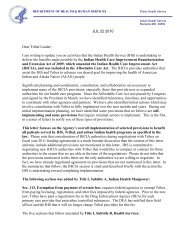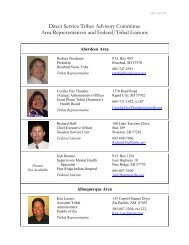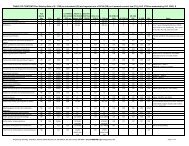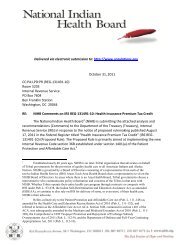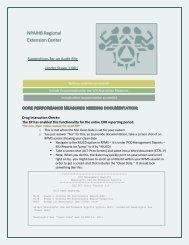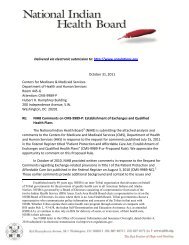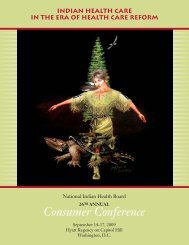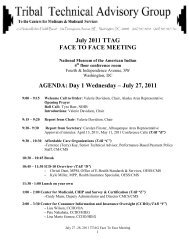mmpc - National Indian Health Board
mmpc - National Indian Health Board
mmpc - National Indian Health Board
You also want an ePaper? Increase the reach of your titles
YUMPU automatically turns print PDFs into web optimized ePapers that Google loves.
Draft Report: Currently being circulated for Tribal leader and health director<br />
review and comment. Please provide comments by October 30, 2012 to Liz<br />
Heintzman at the <strong>National</strong> <strong>Indian</strong> <strong>Health</strong> <strong>Board</strong> at EHeintzman@nihb.org.<br />
The federal government reimburses States 100 percent for Medicaid services delivered to AI/ANs<br />
through IHS and Tribal health programs. States are reimbursed for payments made to Urban <strong>Indian</strong><br />
<strong>Health</strong> Programs for Medicaid services provided to AI/ANs on the basis of the state-specific Federal<br />
Medical Assistance Percentage (FMAP), which in 2013 varies from a minimum of 50 percent up to 73.43<br />
percent. Many programs operated by the IHS and Tribes use a bundled rate approved by the Office of<br />
Management and Budget (OMB) on an annual basis, called the “IHS Reimbursement Rate“ or the ”IHS<br />
encounter rate.” These and other unique circumstances and billing practices are generally not well<br />
understood outside the <strong>Indian</strong> health system. A summary of the legal basis for special CMS provisions<br />
for American <strong>Indian</strong>s and Alaska Natives has been updated and presented in Appendix B (page 39). The<br />
lack of 100 percent FMAP to States for services provided in Urban <strong>Indian</strong> <strong>Health</strong> Programs has precluded<br />
these programs from inclusion in the “IHS encounter rate” reimbursement methodology, and hinders<br />
the recognition by States of the special obligations owed to urban <strong>Indian</strong>s and Urban <strong>Indian</strong> <strong>Health</strong><br />
Programs under Federal law. There is much more work to be done to align the policies, programs, and<br />
systems for billing for CMS services in order to ensure that AI/ANs have the health care coverage they<br />
are entitled to receive.<br />
Tribal consultation is required for CMS programs<br />
The United States government has a unique legal and political relationship with American <strong>Indian</strong> and<br />
Alaska Native Tribes. This special relationship recognizes Tribes as sovereign nations that retain the<br />
inherent right to self-govern, and that interact with the United States on a government-to-government<br />
basis. These rights are grounded in the U.S. Constitution and treaties, and are reinforced by judicial<br />
precedent and Presidential Executive Orders that direct federal agencies to consult with Tribes on a<br />
government-to-government basis. Tribal consultation is an open and continuous exchange of<br />
information that leads to mutual understanding and informed decision making between federal<br />
agencies and tribal governments. Tribal consultation should occur at the earliest possible point in the<br />
policy formulation process, particularly whenever decisions would significantly impact Tribes, would<br />
have a substantial compliance cost, or would result in new or changed policies. Both the Department of<br />
<strong>Health</strong> and Human Services (HHS) and CMS have Tribal consultation policies, and CMS is developing<br />
procedures to operate those policies. The CMS Tribal Consultation policy calls for an annual review and<br />
revisions to update the policy.<br />
The purpose of the first goal of this Strategic Plan is to ensure meaningful consultation with <strong>Indian</strong><br />
Tribes on policy and programmatic issues including, but not limited to eliminating health disparities of<br />
<strong>Indian</strong>s and ensuring access to critical health services, including those made available through Medicare,<br />
Medicaid, CHIP, and Exchange Plans administered by CMS. The involvement of Tribes and the TTAG in<br />
the development of CMS policy allows for culturally appropriate approaches resulting in greater access<br />
8



